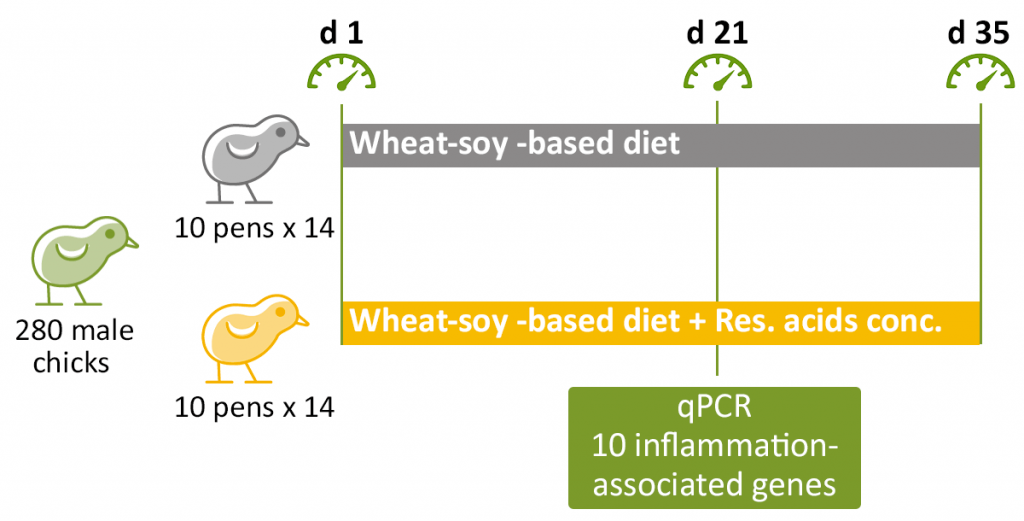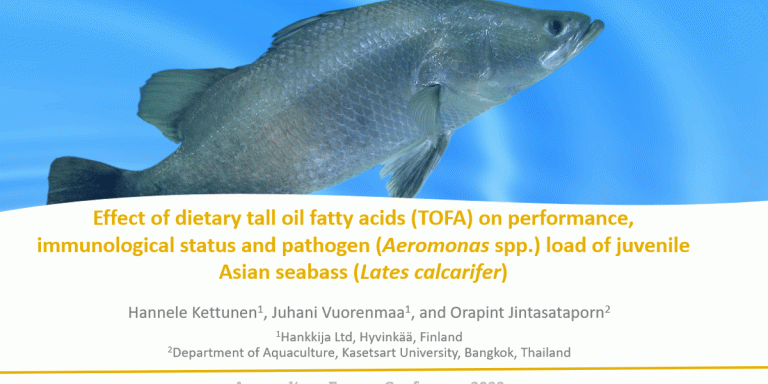Latest articles
- Progres® Liquid: Advancing disease resistance and growth performance in Asian Seabass – Aquaculture Europe Conference 2023
- Effects of Progres® on white shrimp – Aquaculture Europe 2023 conference
- Progres® studies to be presented at Aquaculture Europe 2023 conference
- Hankkija has sold the Progres® feed innovation business to AB Vista
- Progres® and Progut® in the weaner diet increased piglet resilience to F4-ETEC in the post-weaning period – A poster from Schothorst Feed Research at the ZeroZincSummit2022
- Raising piglets without medical ZnO – an example from Finland
- Progut® Extra for dairy cows. Danish Family Farm’s Experience
- Progres® enhances goat kids performance and welfare
- Sustainable Cheese Production: Reducing CH4 emissions

In the recent years, Hankkija, together with professor Filip van Immerseel’s research group at the University of Ghent in Belgium, have studied the mechanism-of-action of dietary resin acids in broiler chicken. In a published study by Aguirre et al. (2019), resin acids were added to broiler chicken diets, which resulted in a significant reduction of inflammation-associated collagen degradation by specific matrix metalloproteinase enzymes (MMPs) in jejunal and ileal epithelium. This effect suggested improved gut barrier functions and a better resilience against various stress factors to gut membrane.
Results of a follow-up study, conducted Alimetrics Research Ltd in Finland, were presented at the 72nd annual meeting of the European Federation of Animal Science (EAAP2021) by Dr. Hannele Kettunen. The study was co-authored by S. Vartiainen, K. Vienola, J. Apajalahti and J. Vuorenmaa, and it was titled as “Immunomodulatory and performance-enhancing effects of dietary resin acids in broiler chickens”.
For the experiment, the hypothesis was that dietary resin acid concentrate (RAC) would affect the expression of genes related to collagen degradation and inflammation in ileal epithelium. A protocol to study the effect of dietary a resin acid concentrate (RAC) on the growth performance of broiler chickens and on the expression of ten immune response -related genes in their intestine was designed.
On the first day of the experiment, male Ross 308 hatchlings were allocated into 20 pens, 14 chicks/pen. The two dietary treatments, both with ten replicates, included a wheat-soy -based control diet (CON) and the same diet amended with 175 g/ton of Resin acid concentrate with 40% resin acids (Hankkija Oy).

The birds were weighed on days 1, 21 and 35, and the feed intake and FCR were determined for the respective periods. Compared with the control treatments, RAC significantly increased bird weight on days 21 and 35, also improving FCR between days 1-21. Mortality was similar in all treatments.
Two birds per pen were sampled on day 21 for gut mucosal tissue, and the samples were analyzed by qPCR for the expression of ten inflammation-associated genes: nuclear factor (NF)-κB subunits 1 and 2, NF-κB inhibitor α, matrix metalloprotein (MMP)-2, MMP-7, MMP-9, interleukin (IL)-6, IL-10, tumor necrosis factor (TNF)-α and peroxisome proliferator activated receptor-ϒ.
The study did not show many significant effects for the ileal gene expression pattern: only the immune modulator NF-κB subunit 2 was affected (increased) by the dietary resin acids.
Thus, the study enforced the existing data suggesting improved performance of broiler chickens with dietary resin acid amendment. However, the data did not allow to draw strong conclusions on the effects of dietary resin acids and ileal gene expression on day 21. The study will be continued by a full-genome mRNA sequencing of the ileal samples.
Check another study presented at EAAP 2021: “Effect of dietary resin acid and zinc oxide in weaned piglets subjected to an immune challenge”

Reference: Aguirre et al. (2019) Vet. Res. 50:15.





